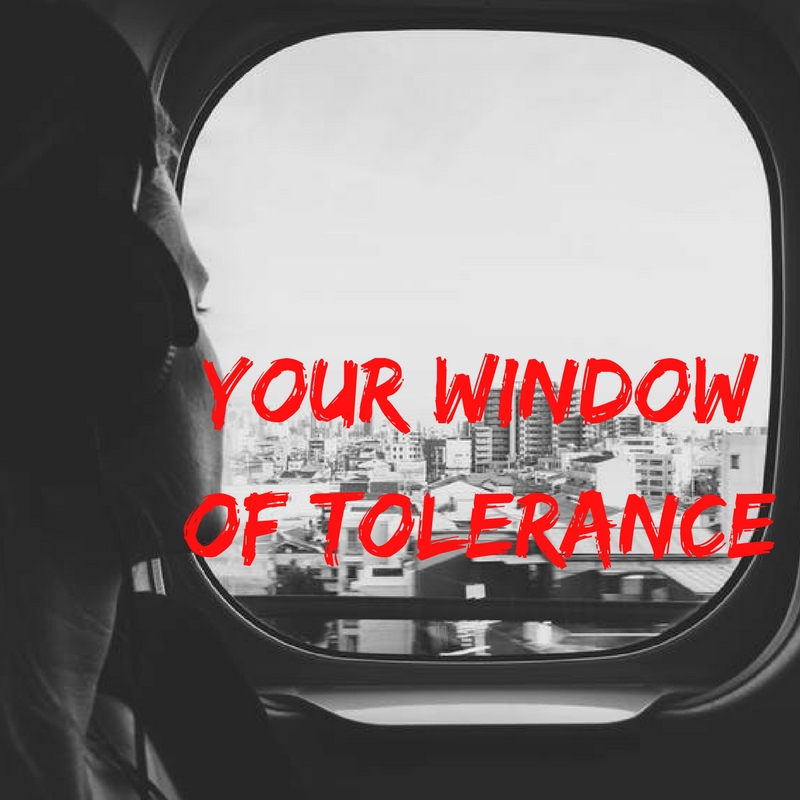You have a space inside from which you are able to understand the world properly and react to everything that happens to you in a healthy way. Only from that space are you able to truly be yourself and connect with the people around you. That space is called the “Window of Tolerance.”
Understanding the Window of Tolerance
We all have that natural state of homeostasis and balance where we feel relaxed and in control. It is also from this place which we can react and adapt to our environment without effort. In the Window of Tolerance, we feel calm, grounded, contained, alert, safe and present. It’s the comfort zone in which we have the ability to self-soothe and self-regulate our emotional state.
During our daily life it’s normal to come across various stress factors that interfere with our balance, so we end up experiencing either hyper- or hypo-arousal. When we experience hyper-arousal the response activated is Fight or Flight.
In this state of arousal, outside our Window of Tolerance, we can experience:
- anxiety
- impulsivity
- intense reactions
- lack of emotional safety
- hyper vigilance
- intrusive imagery
- tension
- shaking
- rigidness
- addictions
- over-eating
- obsessive compulsive thoughts and behavior
- emotional outbursts
- chaotic responses
- the feeling of being ungrounded
- the feeling of being overwhelmed
- anger
- physical and emotional aggression and even rage
In the state of hypo-arousal outside of our Window of Tolerance, we can experience:
- a separation from self
- feelings and emotions
- the feeling of being disconnected and not present
- no display of emotions
- auto-pilot responses
- memory loss
- feign death response
- numbness
- disabled cognitive processing
- decreased reactions to external stimuli
- shame
- depression
- difficulty in engaging coping resources
- low levels of energy
- not feeling like we are present
- not feeling like ourselves
Why is it important to be aware of your own Window of Tolerance?
Understanding the way we function is the only way we can take the next step towards a more balanced life. And this will also increase the quality of our lives. It’s important to be aware of your own Window of Tolerance in order to fully understand who you are and how you function. Only then will you be able to take the next step and improve this window in order to gain your optimal state of balance. This gives you the space you need in order to process correctly the information you receive, adapt optimally to your environment and provide the best response to each stimuli you encounter.

It’s obvious that every time you step out of your Window of Tolerance the amount of energy you are consuming just to adapt and respond to your environment is much higher. This energy must be taken from somewhere so after a state of hyper- or hypo-arousal you might feel tired, hungry, sleepy or numb. If you stay in those states for too long you might even notice that you develop certain physical symptoms due to this psychological distress.
Can we widen our own Window of Tolerance?
Widening the window of tolerance provides psychological flexibility. First of all, there are certain processes that need you to be in your window of tolerance in order to be able to take place properly. One important example is learning. If you are in a balanced state, the information you receive can be fully integrated. The brain needs this state of balance in order to receive and process information properly. Our social interactions are highly affected by our position in relation to our window of tolerance. The frustration that we experience every time we step out of this comfort zone can remain with us for a long period of time.
Being aware of your own window of tolerance should help you understand and respect the window of tolerance of those around you. Being more mindful of their balance will make you a more understanding and supportive person.
What interferes with your Window of Tolerance?
In order to improve your window of tolerance you must first understand what interferes and decreases that area for you. Each and every person has a different space in which they can self-soothe and self-regulate their emotional state. So, it’s important to identify your own history and way of functioning.
You might find yourself trapped in cognitive patterns that decrease your window of tolerance. You might have experienced profound trauma that you carry with you each and every day. Every time something triggers your traumatic memory you will become overwhelmed and step out of your window of tolerance. People are affected by different stress factors so it’s important to learn which of those factors apply to you.
How can you improve your Window of Tolerance?
Even if at the moment, your Window of Tolerance is not big enough and you can’t function properly and respond to your environment as you would want to, there are ways to improve it.
The first step is to understand what shaped you, which past experiences make you react in a certain way to certain stimuli. A therapist can help you in the process of identifying the main events that shaped your response to certain stimuli and that can be easily triggered. Noteworthy is the fact that the most important events you should identify in this journey are traumatic ones. By understanding your trauma you will be able to identify what triggers certain responses during your daily life.
Tools for coming back to your Window of Tolerance
For example, every time you feel you’ve stepped out of your optimal state of arousal, there are tools you can use in order to rebalance yourself. Especially relevant is the fact that you can acknowledge you are not functioning properly. And, this is the first and most important step for changing your current state. Also, you can ask yourself if the feelings you are experiencing are helpful. And if they are not, you can choose to feel from now on (or not). Furthermore, you can think about similar situations and what helped you change your perspective then.
Some tools that you can use in order to rebalance yourself are meditation, mindfulness, music, practicing a hobby or a sport. Make sure that you get enough rest and that you have a healthy diet. These are important areas of your life that influence your mental and emotional balance.
It’s important to talk about the things you are experiencing with someone that can properly help you. In therapy you can fully look at the triggers that make you step out of your window of tolerance and reprocess the memories that left you with those triggers, which will make them lose their power.





